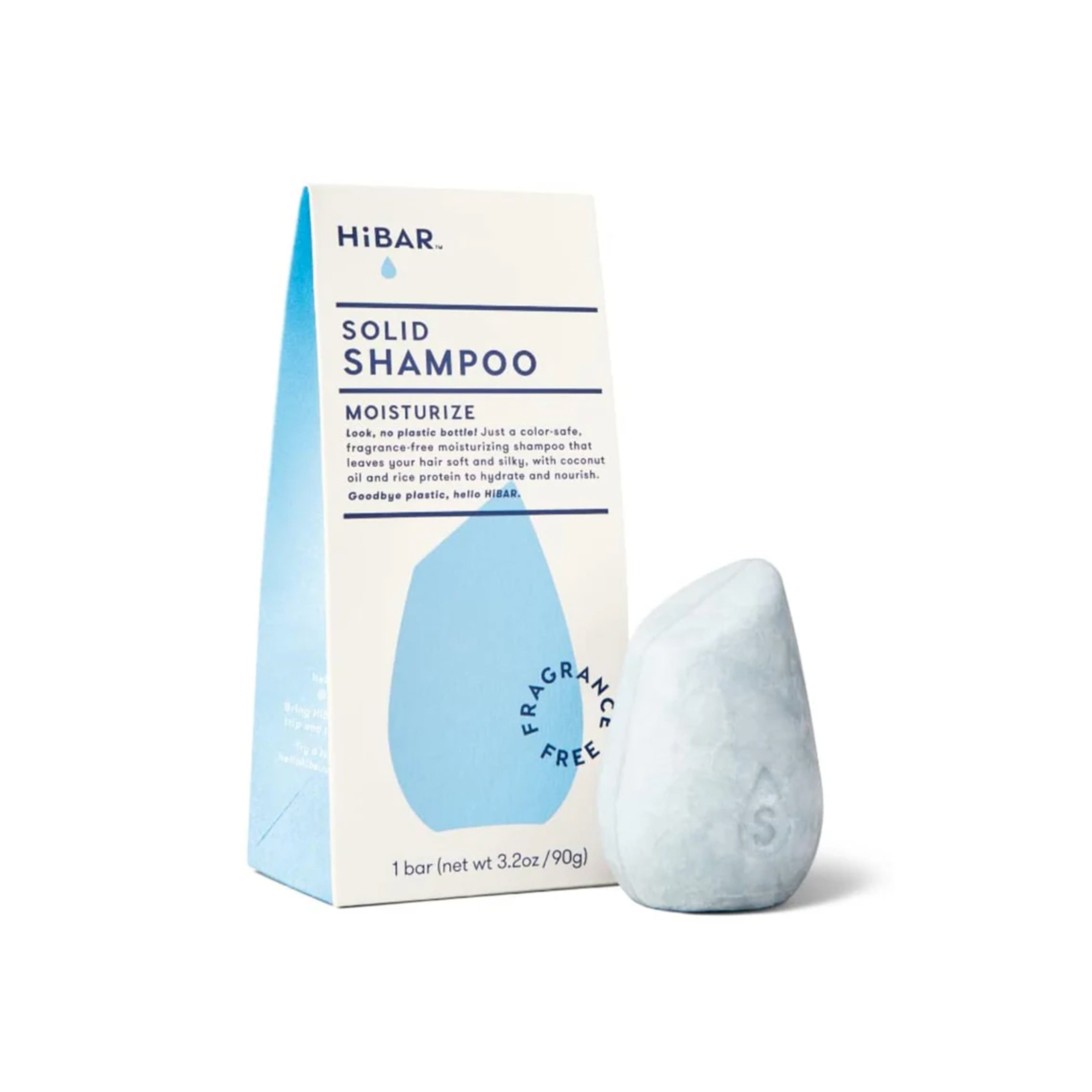
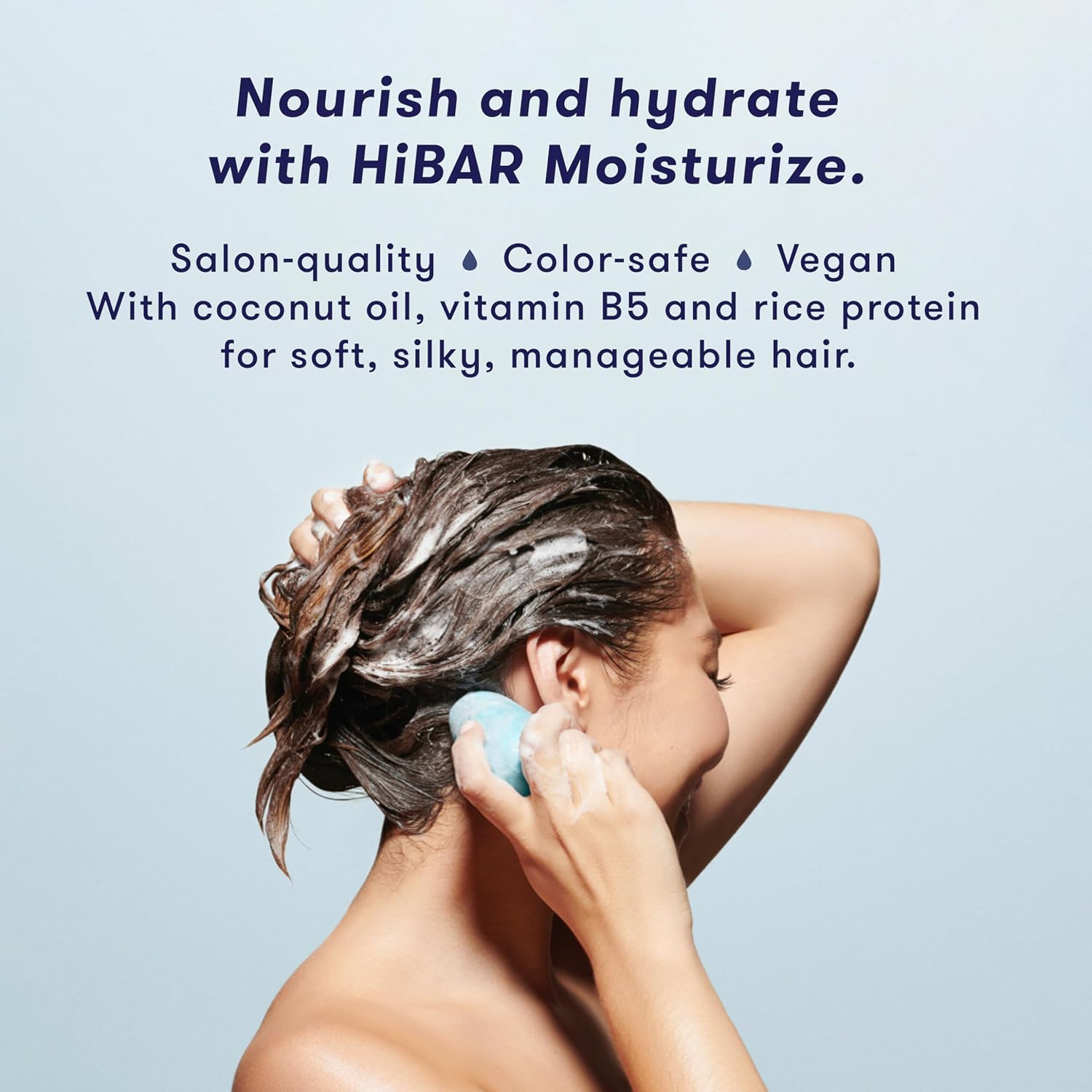
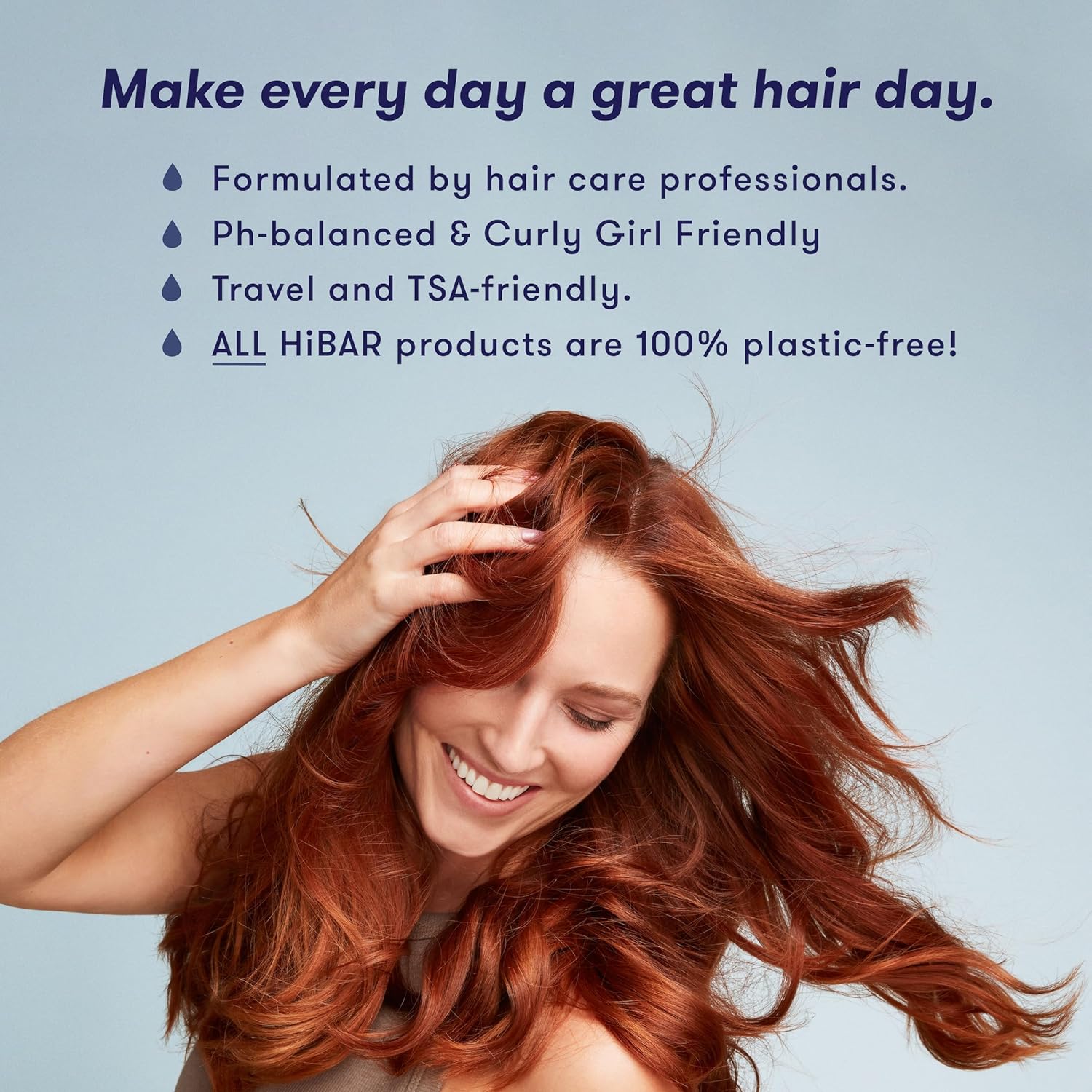
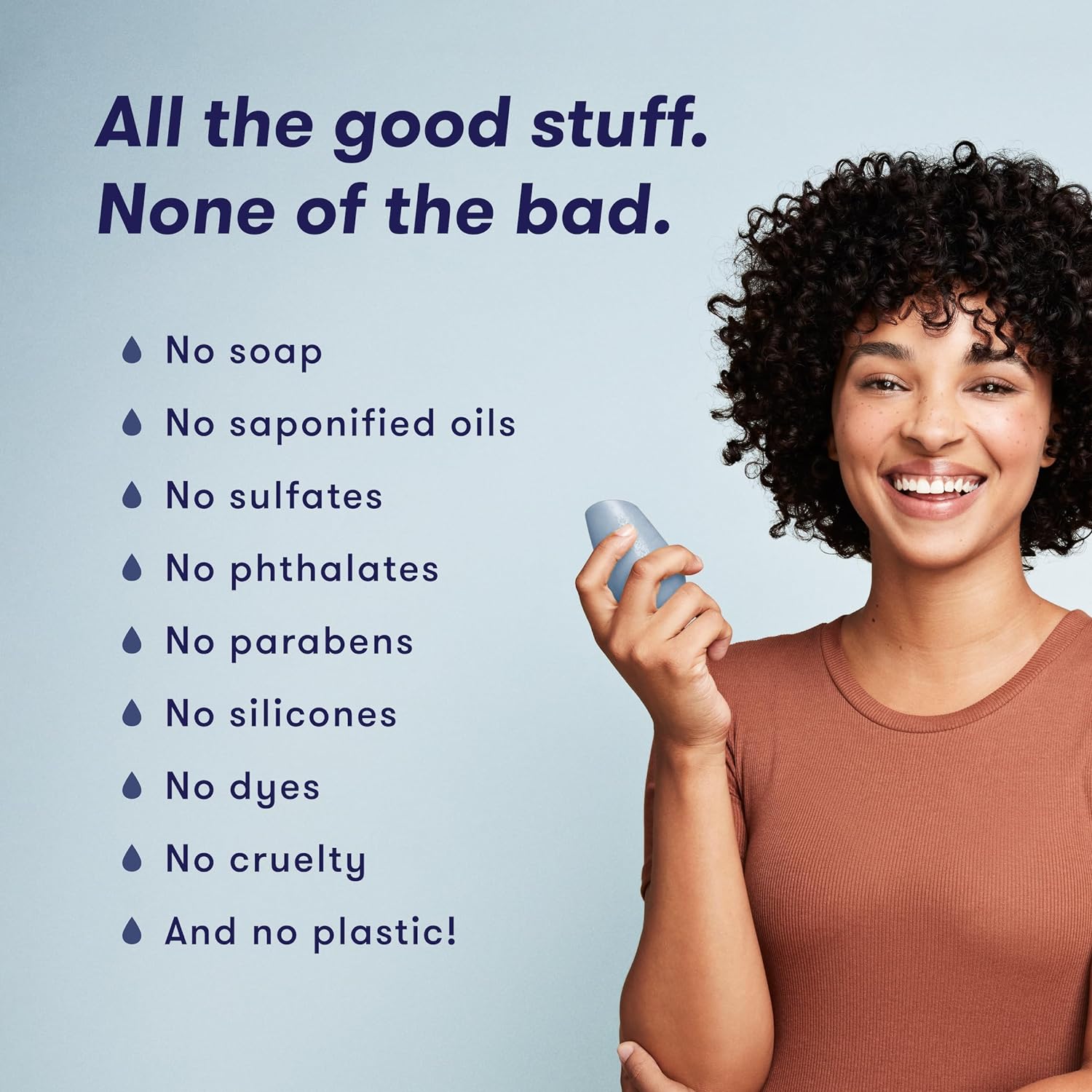
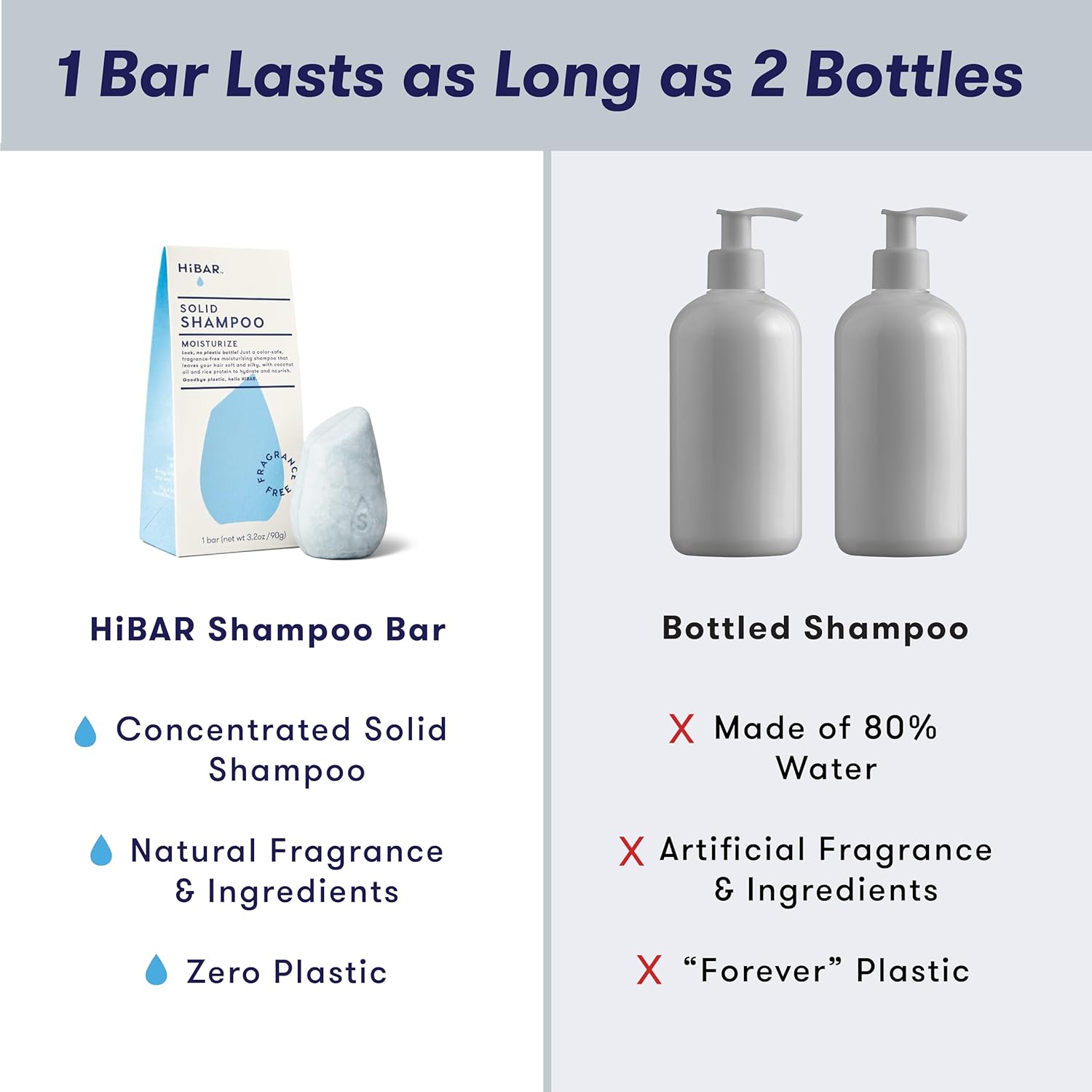
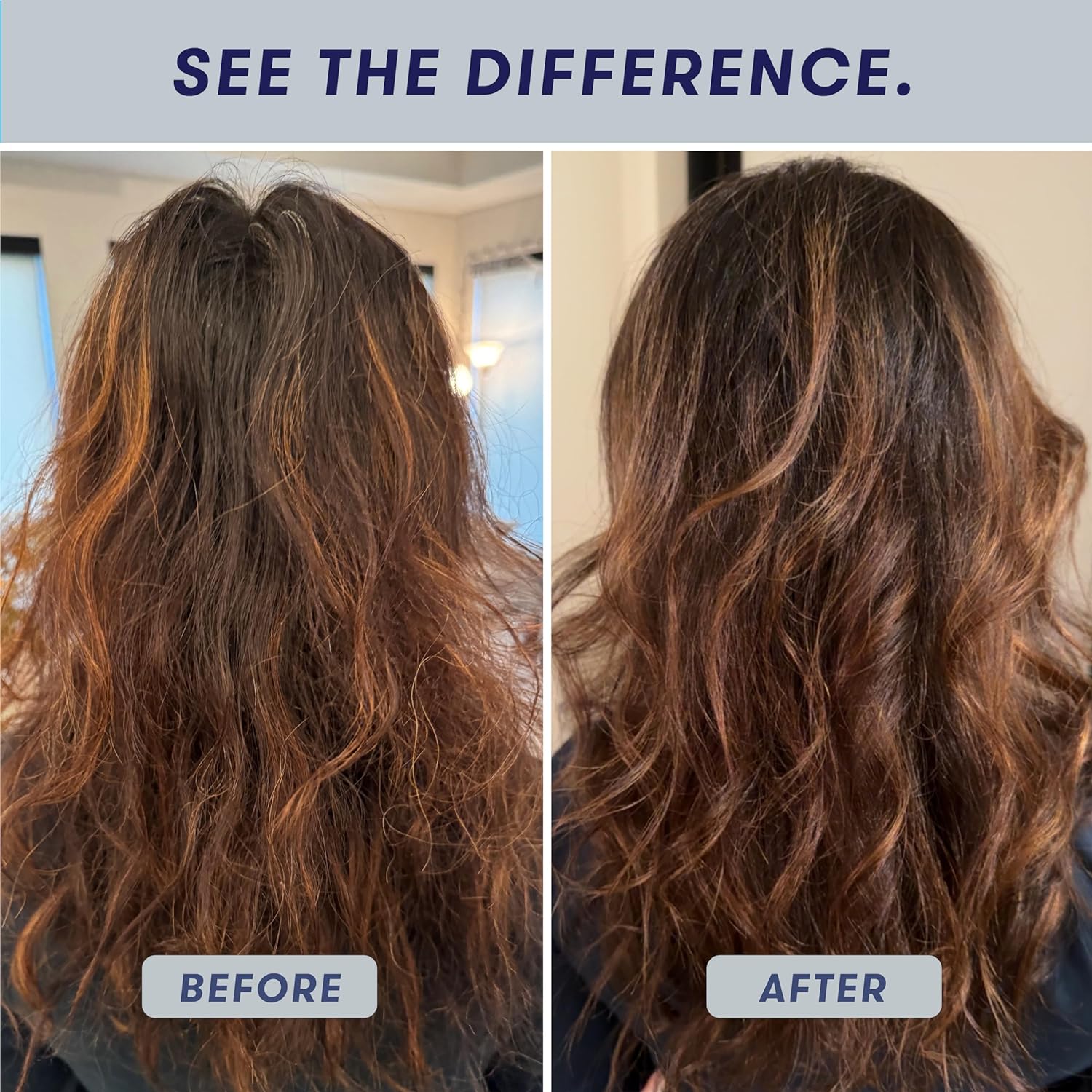
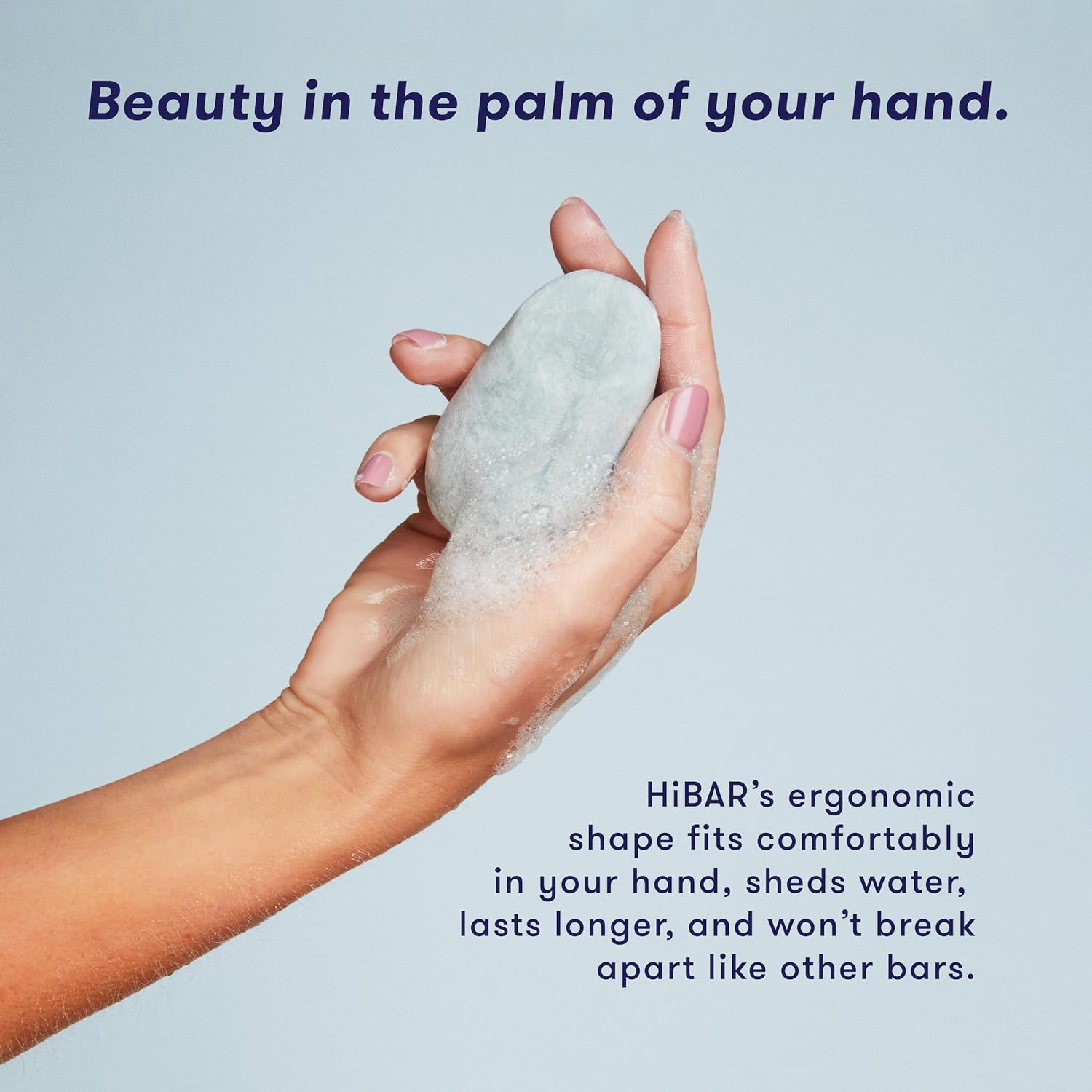
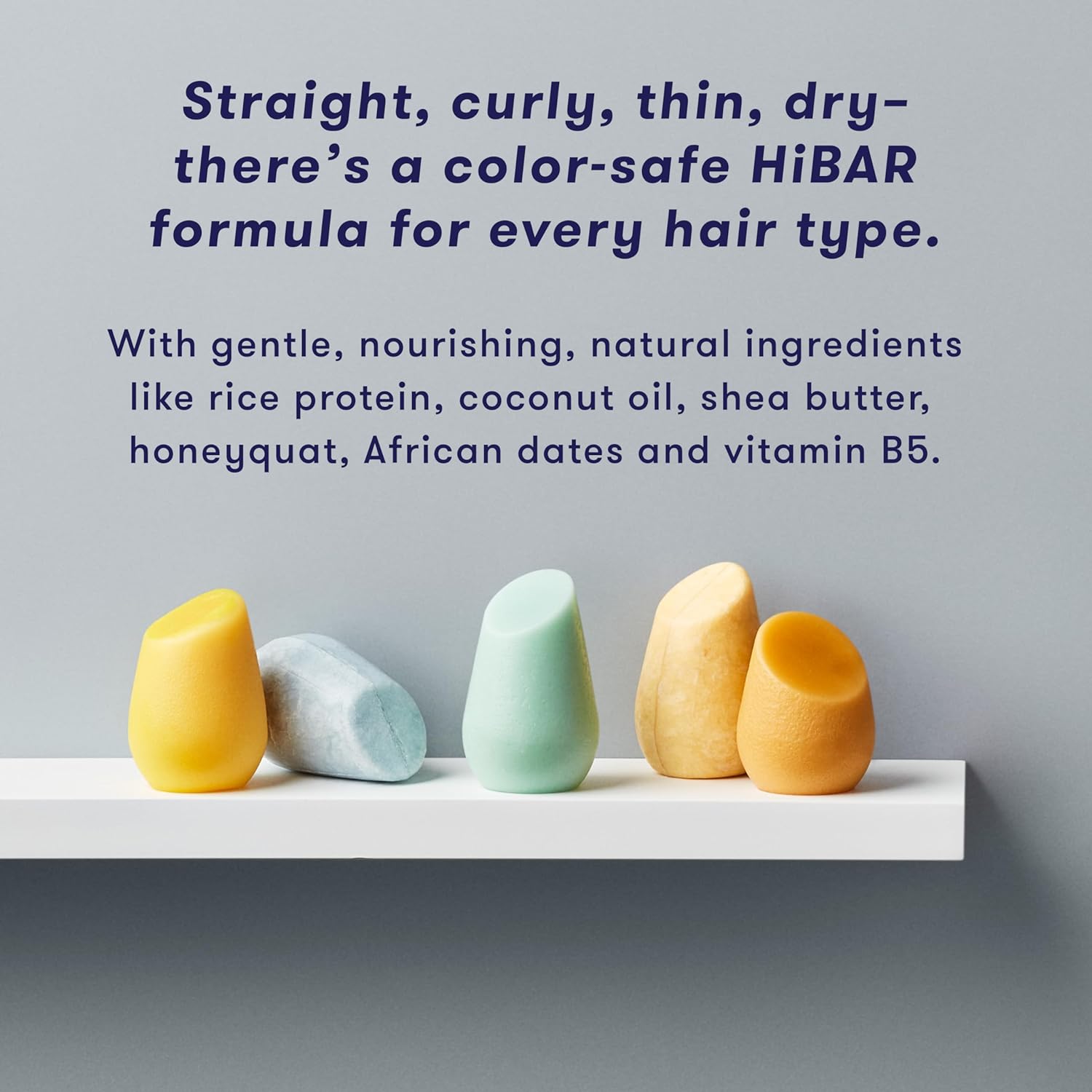
HiBAR Moisturize Shampoo Bar - Nourishes and Hydrates Dry Hair, Fragrance-Free, Vegan - 1 Bar


Ultramarines
High RiskUltramarine (CI 77007) is a mineral-based colorant primarily used in cosmetics and personal care products. It is known for providing vibrant blue hues and is derived from natural sources, making it popular in a variety of formulations.
Sustai Insights
Ultramarine offers functional benefits as a colorant enhancing product aesthetics. Although it is deemed low risk for cancer, allergies, and reproductive toxicity, it has high use restrictions due to regulatory concerns. Potential environmental risks include being a pollutant, while its overall risk level is assessed as high. Safe usage practices should be followed, and alternatives like plant-based colorants may be considered for more sustainable options.
Polyquaternium 7
High RiskPolyquaternium-7 is a synthetic polymer based on quaternary ammonium compounds, commonly used in personal care products for its conditioning, film-forming, and anti-static properties. It enhances the texture and feel of products, making it a popular choice in hair care, skincare, and cosmetics.
Sustai Insights
Polyquaternium-7 offers functional benefits such as effective conditioning and improved product stability. It is generally considered low risk for health concerns like carcinogenicity, allergies, and reproductive toxicity. However, there are high usage restrictions due to regulatory advisories, and it may pose environmental risks, including potential pollution. Overall, the risk level is assessed as high, necessitating cautious usage and consideration of safer alternatives.
Behentrimonium Methosulfate
Medium RiskBehentrimonium methosulfate is a quaternary ammonium salt commonly used in cosmetic formulations as a conditioning agent and emulsifier. It improves the texture and manageability of hair and skin products, enhancing their performance and user experience.
Sustai Insights
Behentrimonium methosulfate offers effective conditioning benefits, making hair and skin products more manageable. It is generally considered low risk for carcinogenicity and developmental toxicity, with moderate concerns regarding allergies. While it poses minimal environmental risks, regulatory bodies have noted some usage restrictions. Overall, this ingredient carries a medium risk level, necessitating careful usage considerations and potential alternatives for sensitive individuals.
Citrus Grandis (Grapefruit) Peel Oil
Medium RiskCitrus grandis (grapefruit) peel oil is a volatile essential oil extracted from the peel of grapefruit. It is commonly used for its aromatic properties and as a flavoring agent in various products such as cosmetics and food. Its composition includes compounds like limonene and citral.
Sustai Insights
Citrus grandis (grapefruit) peel oil offers functional benefits such as fragrance enhancement and potential skin conditioning properties. However, it is associated with a high risk of allergic reactions and may enhance skin absorption of other substances. Regulatory restrictions apply, particularly regarding its use in products containing certain chemicals. Environmental concerns include its potential as a pollutant. Overall, it poses a medium risk, necessitating caution during use, especially for sensitive populations. Alternatives may include oils from less allergenic sources.
Citrus Limon (Lemon) Peel Oil
Medium RiskCitrus limon (lemon) peel oil is an essential oil derived from the peel of lemons, commonly used for its aromatic properties and as a natural flavoring agent. It is often included in personal care products for its fragrance and potential antimicrobial properties.
Sustai Insights
Citrus limon (lemon) peel oil offers functional benefits as a natural fragrance and may possess antimicrobial properties, contributing to product stability. However, it is associated with a high allergenic potential, moderate use restrictions, and has been noted for its persistence in the environment. Regulatory warnings indicate restrictions on verified products due to potential irritation and sensitization. The overall risk level is medium, and safe usage practices should be observed to mitigate exposure risks. Alternatives include safer fragrance options or essential oils with lower allergenic profiles.
Citrus Aurantifolia (Lime) Peel Oil
Medium RiskCitrus aurantifolia (lime) peel oil is derived from the peel of lime fruits. It is commonly used for its aromatic properties in various products, including cosmetics and personal care items, where it may serve as a fragrance or natural preservative.
Sustai Insights
Citrus aurantifolia (lime) peel oil offers functional benefits as a natural fragrance and potential antimicrobial agent. However, it has a high allergenic potential, posing risks of skin irritation and sensitization. Environmental concerns include its persistence in ecosystems and moderate use restrictions in some regions. Regulatory bodies have advised caution regarding its use due to these health and environmental risks. Overall, the ingredient is assessed as a medium risk, suggesting careful usage and consideration of alternatives, such as non-citrus essential oils or synthetic fragrances, for sensitive applications.
Citrus Aurantium Dulcis (Orange) Peel Oil
Medium RiskCitrus aurantium dulcis (orange) peel oil is derived from the peel of oranges and is commonly used in cosmetic and personal care products for its fragrance and potential skin benefits. It is known for its aromatic properties and is often included in formulations aimed at enhancing scent profiles.
Sustai Insights
Citrus aurantium dulcis (orange) peel oil offers functional benefits such as providing a pleasant scent and potential antimicrobial properties. However, it poses a high allergy risk and may cause skin irritation in sensitive individuals. Environmental concerns include moderate persistence and potential to contribute to pollution. Regulatory warnings indicate restrictions on use in certain products. Overall, the risk level is assessed as medium, and users are advised to practice caution, particularly those with known allergies. Alternatives like sweet orange essential oil may provide similar benefits with potentially lower risks.
Zingiber Officinale (Ginger) Oil
Low RiskZingiber officinale (ginger) oil is an essential oil derived from the ginger plant, known for its aromatic properties and use in various cosmetic and therapeutic applications. It is often included for its potential benefits in skin care products, such as providing a soothing effect and contributing to scent.
Sustai Insights
Ginger oil exhibits several functional benefits, including anti-inflammatory and antioxidant properties, which may enhance product efficacy. It is typically sustainably sourced and biodegradable. Health risks are minimal, with low concerns regarding carcinogenicity, allergies, or reproductive toxicity. Environmental impact is low, with no significant pollutant potential. Regulatory agencies do not impose restrictions on its use. Overall, ginger oil is assessed as low risk, making it a suitable ingredient in formulations.
Stearic Acid
Low RiskStearic acid is a naturally occurring fatty acid commonly found in animal and vegetable fats. It functions primarily as an emulsifier, thickener, and stabilizer in cosmetic and personal care products, providing texture and consistency.
Sustai Insights
Stearic acid offers functional benefits such as effective emulsification and stabilization of formulations. It is derived from renewable sources and is biodegradable, contributing to its sustainability profile. Health risks are low, with minimal concerns regarding carcinogenicity, allergies, or reproductive toxicity. Environmental risks are also low, with no significant pollutants or bioaccumulation concerns noted. Regulatory bodies, including the FDA, do not impose restrictions on its use. Overall, stearic acid is assessed as low risk, and its safe usage practices are well-established, with no significant alternatives needed.
Sodium Cocoyl Isethionate
Low RiskSodium cocoyl isethionate is a surfactant derived from coconut oil, commonly used in cosmetic formulations. It functions as a cleansing and foaming agent, contributing to the texture and effectiveness of personal care products such as shampoos and body washes. It helps to remove dirt and oils from the skin and hair.
Sustai Insights
Sodium cocoyl isethionate offers functional benefits as a gentle surfactant that effectively cleanses without stripping moisture. It is biodegradable and derived from renewable sources, enhancing its sustainability profile. Health risks are low, with minimal potential for irritation or allergies noted. Regulatory bodies have not imposed significant restrictions, indicating a favorable risk assessment overall. Usage should be within recommended concentrations to maintain safety. Alternatives include milder surfactants like decyl glucoside for those seeking gentler options. Overall, the ingredient is assessed to have a low risk.
Hydrolyzed Rice Protein
Low RiskHydrolyzed rice protein is a hydrolysate of rice protein, commonly used in cosmetic and personal care products for its film-forming and moisturizing properties. It serves as a conditioning agent that can enhance the texture and feel of formulations.
Sustai Insights
Hydrolyzed rice protein offers functional benefits such as improving moisture retention and hair manageability. It is derived from renewable sources and is biodegradable. Health risks are generally low, with minimal concerns regarding carcinogenicity, allergies, or reproductive toxicity. However, contamination concerns are noted. Environmental risks appear low, with no significant pollutant or bioaccumulative properties. Regulatory status indicates no major restrictions. Overall, the risk level is assessed as low, making it a viable ingredient in formulations with appropriate usage practices.
Panthenol
Low RiskPanthenol, a derivative of vitamin B5, is commonly used in cosmetic formulations for its moisturizing and skin-conditioning properties. It acts as a humectant, helping to retain moisture in the skin and hair, thereby improving hydration and texture.
Sustai Insights
Panthenol offers functional benefits such as effective hydration and skin conditioning, making it valuable in various cosmetic products. It is considered low risk regarding health impacts, with minimal concerns about carcinogenicity, allergies, or reproductive toxicity. Environmental risks are also low, with no significant pollutant or bioaccumulation potential. Regulatory bodies have not imposed restrictions on its use. Safe usage practices include adhering to recommended concentrations. Alternatives like glycerin may provide similar moisturizing benefits, but overall, panthenol is assessed as a low-risk ingredient.
Cetyl Alcohol
Low RiskCetyl alcohol is a long-chain organic alcohol commonly used in cosmetic formulations. It serves as an emollient, emulsifier, and thickening agent, enhancing the texture and stability of products. Cetyl alcohol is derived from natural sources, such as coconut or palm oil, and is often included in creams, lotions, and hair conditioners.
Sustai Insights
Cetyl alcohol offers functional benefits as an emollient and emulsifier, improving product texture and stability. It is biodegradable and sourced from renewable materials, contributing to sustainability. Health risks are minimal, with low concerns for carcinogenicity, allergies, or reproductive toxicity. Environmental impact is also low, with no significant pollutant or bioaccumulation potential. Regulatory bodies have not placed restrictions on its use, indicating a favorable safety profile. Overall, cetyl alcohol is assessed as low risk, and safe usage practices include ensuring proper formulation concentrations.
Glyceryl Monostearate
Low RiskGlyceryl monostearate is a monoester of glycerol and stearic acid, commonly used as an emulsifier and stabilizer in food and cosmetic products. It helps blend oil and water-based ingredients, improving product texture and consistency.
Sustai Insights
Glyceryl monostearate offers functional benefits as an effective emulsifier, enhancing product stability and texture. It is derived from natural sources and is considered biodegradable. Health risks associated with it are low, as it shows no significant carcinogenic, allergenic, or reproductive toxicity effects. Environmental concerns are minimal, with no known pollutant or bioaccumulation issues. Regulatory bodies have not restricted its use, and it is generally regarded as safe. Overall, glyceryl monostearate presents a low risk profile, making it a suitable ingredient in various applications.
Cocos Nucifera (Coconut) Oil
Low RiskCocos Nucifera (Coconut) Oil is derived from the kernels of the coconut palm. It is primarily used in cosmetic formulations for its emollient and moisturizing properties, making it suitable for skin and hair care products.
Sustai Insights
Coconut oil serves as an effective moisturizer and emollient, promoting skin hydration and softness. It is sustainably sourced and biodegradable. Health risks are minimal, with low concerns regarding carcinogenicity, allergens, and reproductive toxicity. Environmental impact is also low, as it does not contribute significantly to pollution or bioaccumulation. Regulatory bodies have not issued restrictions on its use. Overall, coconut oil presents a low risk for health and environmental concerns, making it a safe ingredient in cosmetic products.
Zingiber Officinale (Ginger) Oil
Low RiskZingiber officinale (ginger) oil is an essential oil derived from the ginger plant, known for its aromatic properties and use in various cosmetic and therapeutic applications. It is often included for its potential benefits in skin care products, such as providing a soothing effect and contributing to scent.
Sustai Insights
Ginger oil exhibits several functional benefits, including anti-inflammatory and antioxidant properties, which may enhance product efficacy. It is typically sustainably sourced and biodegradable. Health risks are minimal, with low concerns regarding carcinogenicity, allergies, or reproductive toxicity. Environmental impact is low, with no significant pollutant potential. Regulatory agencies do not impose restrictions on its use. Overall, ginger oil is assessed as low risk, making it a suitable ingredient in formulations.
Behentrimonium Methosulfate
Medium RiskBehentrimonium methosulfate is a quaternary ammonium salt commonly used in cosmetic formulations as a conditioning agent and emulsifier. It improves the texture and manageability of hair and skin products, enhancing their performance and user experience.
Sustai Insights
Behentrimonium methosulfate offers effective conditioning benefits, making hair and skin products more manageable. It is generally considered low risk for carcinogenicity and developmental toxicity, with moderate concerns regarding allergies. While it poses minimal environmental risks, regulatory bodies have noted some usage restrictions. Overall, this ingredient carries a medium risk level, necessitating careful usage considerations and potential alternatives for sensitive individuals.
Stearic Acid
Low RiskStearic acid is a naturally occurring fatty acid commonly found in animal and vegetable fats. It functions primarily as an emulsifier, thickener, and stabilizer in cosmetic and personal care products, providing texture and consistency.
Sustai Insights
Stearic acid offers functional benefits such as effective emulsification and stabilization of formulations. It is derived from renewable sources and is biodegradable, contributing to its sustainability profile. Health risks are low, with minimal concerns regarding carcinogenicity, allergies, or reproductive toxicity. Environmental risks are also low, with no significant pollutants or bioaccumulation concerns noted. Regulatory bodies, including the FDA, do not impose restrictions on its use. Overall, stearic acid is assessed as low risk, and its safe usage practices are well-established, with no significant alternatives needed.
Sodium Cocoyl Isethionate
Low RiskSodium cocoyl isethionate is a surfactant derived from coconut oil, commonly used in cosmetic formulations. It functions as a cleansing and foaming agent, contributing to the texture and effectiveness of personal care products such as shampoos and body washes. It helps to remove dirt and oils from the skin and hair.
Sustai Insights
Sodium cocoyl isethionate offers functional benefits as a gentle surfactant that effectively cleanses without stripping moisture. It is biodegradable and derived from renewable sources, enhancing its sustainability profile. Health risks are low, with minimal potential for irritation or allergies noted. Regulatory bodies have not imposed significant restrictions, indicating a favorable risk assessment overall. Usage should be within recommended concentrations to maintain safety. Alternatives include milder surfactants like decyl glucoside for those seeking gentler options. Overall, the ingredient is assessed to have a low risk.
Citrus Grandis (Grapefruit) Peel Oil
Medium RiskCitrus grandis (grapefruit) peel oil is a volatile essential oil extracted from the peel of grapefruit. It is commonly used for its aromatic properties and as a flavoring agent in various products such as cosmetics and food. Its composition includes compounds like limonene and citral.
Sustai Insights
Citrus grandis (grapefruit) peel oil offers functional benefits such as fragrance enhancement and potential skin conditioning properties. However, it is associated with a high risk of allergic reactions and may enhance skin absorption of other substances. Regulatory restrictions apply, particularly regarding its use in products containing certain chemicals. Environmental concerns include its potential as a pollutant. Overall, it poses a medium risk, necessitating caution during use, especially for sensitive populations. Alternatives may include oils from less allergenic sources.
Hydrolyzed Rice Protein
Low RiskHydrolyzed rice protein is a hydrolysate of rice protein, commonly used in cosmetic and personal care products for its film-forming and moisturizing properties. It serves as a conditioning agent that can enhance the texture and feel of formulations.
Sustai Insights
Hydrolyzed rice protein offers functional benefits such as improving moisture retention and hair manageability. It is derived from renewable sources and is biodegradable. Health risks are generally low, with minimal concerns regarding carcinogenicity, allergies, or reproductive toxicity. However, contamination concerns are noted. Environmental risks appear low, with no significant pollutant or bioaccumulative properties. Regulatory status indicates no major restrictions. Overall, the risk level is assessed as low, making it a viable ingredient in formulations with appropriate usage practices.
Citrus Limon (Lemon) Peel Oil
Medium RiskCitrus limon (lemon) peel oil is an essential oil derived from the peel of lemons, commonly used for its aromatic properties and as a natural flavoring agent. It is often included in personal care products for its fragrance and potential antimicrobial properties.
Sustai Insights
Citrus limon (lemon) peel oil offers functional benefits as a natural fragrance and may possess antimicrobial properties, contributing to product stability. However, it is associated with a high allergenic potential, moderate use restrictions, and has been noted for its persistence in the environment. Regulatory warnings indicate restrictions on verified products due to potential irritation and sensitization. The overall risk level is medium, and safe usage practices should be observed to mitigate exposure risks. Alternatives include safer fragrance options or essential oils with lower allergenic profiles.
Ultramarines
High RiskUltramarine (CI 77007) is a mineral-based colorant primarily used in cosmetics and personal care products. It is known for providing vibrant blue hues and is derived from natural sources, making it popular in a variety of formulations.
Sustai Insights
Ultramarine offers functional benefits as a colorant enhancing product aesthetics. Although it is deemed low risk for cancer, allergies, and reproductive toxicity, it has high use restrictions due to regulatory concerns. Potential environmental risks include being a pollutant, while its overall risk level is assessed as high. Safe usage practices should be followed, and alternatives like plant-based colorants may be considered for more sustainable options.
Citrus Aurantifolia (Lime) Peel Oil
Medium RiskCitrus aurantifolia (lime) peel oil is derived from the peel of lime fruits. It is commonly used for its aromatic properties in various products, including cosmetics and personal care items, where it may serve as a fragrance or natural preservative.
Sustai Insights
Citrus aurantifolia (lime) peel oil offers functional benefits as a natural fragrance and potential antimicrobial agent. However, it has a high allergenic potential, posing risks of skin irritation and sensitization. Environmental concerns include its persistence in ecosystems and moderate use restrictions in some regions. Regulatory bodies have advised caution regarding its use due to these health and environmental risks. Overall, the ingredient is assessed as a medium risk, suggesting careful usage and consideration of alternatives, such as non-citrus essential oils or synthetic fragrances, for sensitive applications.
Polyquaternium 7
High RiskPolyquaternium-7 is a synthetic polymer based on quaternary ammonium compounds, commonly used in personal care products for its conditioning, film-forming, and anti-static properties. It enhances the texture and feel of products, making it a popular choice in hair care, skincare, and cosmetics.
Sustai Insights
Polyquaternium-7 offers functional benefits such as effective conditioning and improved product stability. It is generally considered low risk for health concerns like carcinogenicity, allergies, and reproductive toxicity. However, there are high usage restrictions due to regulatory advisories, and it may pose environmental risks, including potential pollution. Overall, the risk level is assessed as high, necessitating cautious usage and consideration of safer alternatives.
Citrus Aurantium Dulcis (Orange) Peel Oil
Medium RiskCitrus aurantium dulcis (orange) peel oil is derived from the peel of oranges and is commonly used in cosmetic and personal care products for its fragrance and potential skin benefits. It is known for its aromatic properties and is often included in formulations aimed at enhancing scent profiles.
Sustai Insights
Citrus aurantium dulcis (orange) peel oil offers functional benefits such as providing a pleasant scent and potential antimicrobial properties. However, it poses a high allergy risk and may cause skin irritation in sensitive individuals. Environmental concerns include moderate persistence and potential to contribute to pollution. Regulatory warnings indicate restrictions on use in certain products. Overall, the risk level is assessed as medium, and users are advised to practice caution, particularly those with known allergies. Alternatives like sweet orange essential oil may provide similar benefits with potentially lower risks.
Panthenol
Low RiskPanthenol, a derivative of vitamin B5, is commonly used in cosmetic formulations for its moisturizing and skin-conditioning properties. It acts as a humectant, helping to retain moisture in the skin and hair, thereby improving hydration and texture.
Sustai Insights
Panthenol offers functional benefits such as effective hydration and skin conditioning, making it valuable in various cosmetic products. It is considered low risk regarding health impacts, with minimal concerns about carcinogenicity, allergies, or reproductive toxicity. Environmental risks are also low, with no significant pollutant or bioaccumulation potential. Regulatory bodies have not imposed restrictions on its use. Safe usage practices include adhering to recommended concentrations. Alternatives like glycerin may provide similar moisturizing benefits, but overall, panthenol is assessed as a low-risk ingredient.
Cetyl Alcohol
Low RiskCetyl alcohol is a long-chain organic alcohol commonly used in cosmetic formulations. It serves as an emollient, emulsifier, and thickening agent, enhancing the texture and stability of products. Cetyl alcohol is derived from natural sources, such as coconut or palm oil, and is often included in creams, lotions, and hair conditioners.
Sustai Insights
Cetyl alcohol offers functional benefits as an emollient and emulsifier, improving product texture and stability. It is biodegradable and sourced from renewable materials, contributing to sustainability. Health risks are minimal, with low concerns for carcinogenicity, allergies, or reproductive toxicity. Environmental impact is also low, with no significant pollutant or bioaccumulation potential. Regulatory bodies have not placed restrictions on its use, indicating a favorable safety profile. Overall, cetyl alcohol is assessed as low risk, and safe usage practices include ensuring proper formulation concentrations.
Glyceryl Monostearate
Low RiskGlyceryl monostearate is a monoester of glycerol and stearic acid, commonly used as an emulsifier and stabilizer in food and cosmetic products. It helps blend oil and water-based ingredients, improving product texture and consistency.
Sustai Insights
Glyceryl monostearate offers functional benefits as an effective emulsifier, enhancing product stability and texture. It is derived from natural sources and is considered biodegradable. Health risks associated with it are low, as it shows no significant carcinogenic, allergenic, or reproductive toxicity effects. Environmental concerns are minimal, with no known pollutant or bioaccumulation issues. Regulatory bodies have not restricted its use, and it is generally regarded as safe. Overall, glyceryl monostearate presents a low risk profile, making it a suitable ingredient in various applications.
Cocos Nucifera (Coconut) Oil
Low RiskCocos Nucifera (Coconut) Oil is derived from the kernels of the coconut palm. It is primarily used in cosmetic formulations for its emollient and moisturizing properties, making it suitable for skin and hair care products.
Sustai Insights
Coconut oil serves as an effective moisturizer and emollient, promoting skin hydration and softness. It is sustainably sourced and biodegradable. Health risks are minimal, with low concerns regarding carcinogenicity, allergens, and reproductive toxicity. Environmental impact is also low, as it does not contribute significantly to pollution or bioaccumulation. Regulatory bodies have not issued restrictions on its use. Overall, coconut oil presents a low risk for health and environmental concerns, making it a safe ingredient in cosmetic products.
Discover HiBAR's Moisturize Fragrance-Free Shampoo Bar, the perfect solution for dry, frizzy hair. This eco-friendly shampoo bar nourishes and hydrates while being completely fragrance-free, making it ideal for sensitive scalps. Enjoy silky, manageable hair with our clean, natural ingredients.
- Deep Moisture and Nourishment: Enriched with coconut oil and vitamin B5 to restore your hair’s natural resilience, resulting in soft and revitalized locks.
- Fragrance-Free Formula: Specially crafted for those with sensitivities, ensuring a gentle wash without essential oils or artificial fragrances.
- Eco-Conscious Choice: Each bar lasts as long as two bottles of liquid shampoo, significantly reducing plastic waste and water usage.
- Vegan and Clean Ingredients: Certified vegan with no sulfates, parabens, or harsh chemicals, safe for color-treated hair and kind to the environment.
- Recyclable Packaging: HiBAR is committed to sustainability; all packaging is fully recyclable or compostable, supporting a plastic-free future.
Subscribe & Save with Sustai
- Best Price Guarantee: Always enjoy the lowest prices on sustainable home essentials.
- No Surprises: We’ll notify you before shipping. No hidden fees, ever.
- You’re in Charge: Change, pause, or cancel your subscription anytime with ease.
- Eco-Friendly Deliveries: Our grouped shipments mean less packaging and lower emissions.
Join us on a sustainable journey. Special offers for a limited time! Prices and promotions may change.
Recommended Products
Discover HiBAR's Moisturize Fragrance-Free Shampoo Bar, the perfect solution for dry, frizzy hair. This eco-friendly shampoo bar nourishes and hydrates while being completely fragrance-free, making it ideal for sensitive scalps. Enjoy silky, manageable hair with our clean, natural ingredients.
- Deep Moisture and Nourishment: Enriched with coconut oil and vitamin B5 to restore your hair’s natural resilience, resulting in soft and revitalized locks.
- Fragrance-Free Formula: Specially crafted for those with sensitivities, ensuring a gentle wash without essential oils or artificial fragrances.
- Eco-Conscious Choice: Each bar lasts as long as two bottles of liquid shampoo, significantly reducing plastic waste and water usage.
- Vegan and Clean Ingredients: Certified vegan with no sulfates, parabens, or harsh chemicals, safe for color-treated hair and kind to the environment.
- Recyclable Packaging: HiBAR is committed to sustainability; all packaging is fully recyclable or compostable, supporting a plastic-free future.

You can have at most 2 Sustainable Steals products in your cart
Customer Reviews
Customers’ View
Customers appreciate the effectiveness and eco-friendly nature of the Fragrance-Free Moisturize Shampoo Bar. Many highlight its gentle formula, noting that it cleanses well without harsh chemicals, leaving hair soft, manageable, and healthy. Reviews frequently mention the shampoo's impressive lather and longevity, with one customer stating, "It exceeded my expectations - great lather, clean ingredients, lasts a long time & leaves my hair feeling great!" Additionally, users value the 100% plastic-free packaging, making it a sustainable choice for those looking to reduce their environmental impact. However, opinions on the scent are mixed, with some finding it pleasant while others express dissatisfaction. Overall, customers find this product effective and aligned with their sustainable lifestyle.
AI-generated from the text of customer reviewsThis product is rated 4.7 of 5.0 stars.
It has received 146 reviews.




